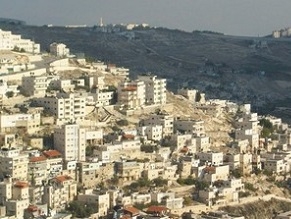|
World Jewish News

East Jerusalem. Photo: Wikimedia Commons
|
C’tee accused of illegal construction plan in E. Jerusalem
22.04.2013, Israel In a petition submitted Sunday to the Jerusalem Administrative Court, two human rights organizations requested the District Committee for Planning and Building cease treating the unauthorized “Jerusalem 2000 Outline Plan” as a ratified legal document.
In the petition, the Association for Civil Rights in Israel (ACRI) and Bimkom (Planners for Planning Rights) argue that the controversial outline plan – which was never passed into law, and severely restricts construction by Palestinians in east Jerusalem – is illegally being enforced.
“Instead of alleviating the ongoing planning crisis and allowing for improvements in public services, the [District Planning and Building Committee] has chosen to further violate the residents’ rights to adequate housing, education, health and employment,” said ACRI attorney Keren Tzafrir in a statement.
“The already limited opportunities faced by east Jerusalem residents in developing their neighborhoods and receiving building permits are being further restricted by the decision to consider the unapproved outline plan as a ‘policy document,’” she continued.
However, the Jerusalem Municipality issued a statement flatly denying the petition’s assertions.
“The Jerusalem Municipality rejects the allegations as incorrect and inaccurate,” the statement read. “This is a program that has been planned for over 10 years and aims to guide and outline the development of the city in the coming decades.”
The municipality claimed the program will create the construction of 50,000 housing units in all parts of Jerusalem – two-thirds for the Jewish sector and onethird for the Arab sector, in relation to their respective populations.
Still, Palestinians constitute 39 percent of Jerusalem’s residents, yet the total area designated for building in their neighborhoods covers only 14% of east Jerusalem, or just 7.8% of the entire city, said ACRI.
The municipality countered that the outline plan reflects the “vision of the municipality to stop the emigration from the city and accelerate economic development in the coming years,” noting that it will provide affordable housing for young people, the development of east Jerusalem and the development of tourism and employment areas.
According to the petition, in 2007 the Local Planning Committee of Jerusalem recommended that the District Committee for Planning and Building approve the plan, which would subsequently be presented for public review before being passed into law.
However, following extensive political and public opposition, the plan was never submitted to the public for oversight, preventing it from becoming ratified.
“In contravention of legal procedure, planning authorities have been using the plan as a ‘policy document’ with which new building and development plans must comply,” said Tzafrir. “This de facto change bypasses the statutory procedures enacted to ensure transparency and public review.”
The petition states that by bypassing the stage of submitting the plan for public dissemination, the District Committee negated its legal obligation of due diligence by preventing the public from presenting objections and seeking compensation for damages caused by the proposal.
“The committee’s actions contradict the rules of good governance, the principle of legality, the obligation of transparency, and the requirement of including the public in planning procedures,” the petition stated.
According to ACRI and Bimkom, east Jerusalem has suffered from a severe lack of planning and development for nearly 50 years.
“Palestinian residents face extreme limitations on building and planning, and suffer from acute shortage of housing, crowded living conditions, and an acrossthe- board lack of public spaces and institutions such as schools, medical centers, postal offices, etc.,” ACRI said in a statement.
ACRI spokesperson Ronit Sela said the 2000 Outline Plan makes getting building permits “nearly impossible” for east Jerusalem residents.
“Palestinians in east Jerusalem already face many limitations on building new homes and developing their neighborhoods,” said Sela.
“The existing outline plan creates additional limitations to the extent that it’s nearly impossible to get the necessary approval for building of any kind there.”
According to Efrat Cohen- Bar, an architect from Bimkom, due to planning limitations, residents of east Jerusalem took it upon themselves to build independently prior to the outline plan being enforced.
“For a decade or so, before the freeze caused by the Jerusalem 2000 Outline Plan, they initiated building plans for themselves and by themselves,” said Cohen- Bar.
“Unfortunately, the District Committee decided to freeze many such plans, on the basis of an outline plan that lacks validation, resulting in an even greater planning chaos in east Jerusalem.”
Meanwhile, the municipality claimed that after the outline plan is approved, “the bureaucratic procedures for getting building permits in the city will be easier.”
It is unclear when the court will review or deliberate on the petition.
By DANIEL K. EISENBUD
JPost.com
|
|
